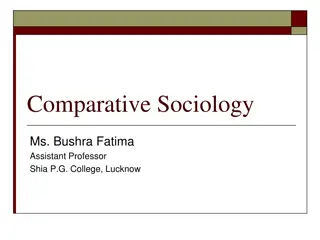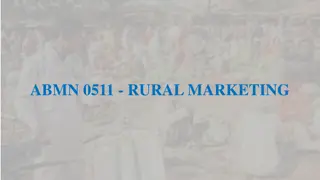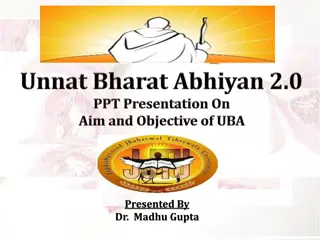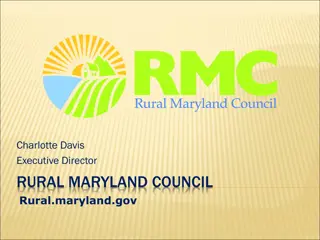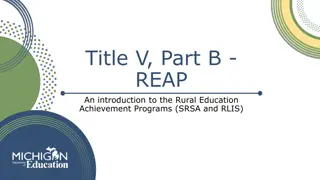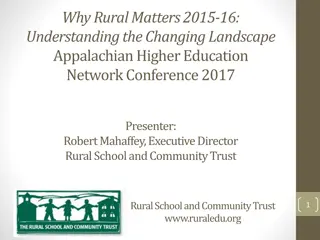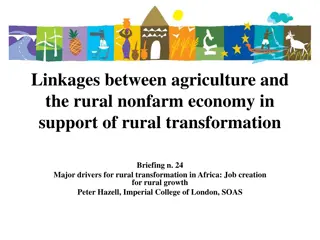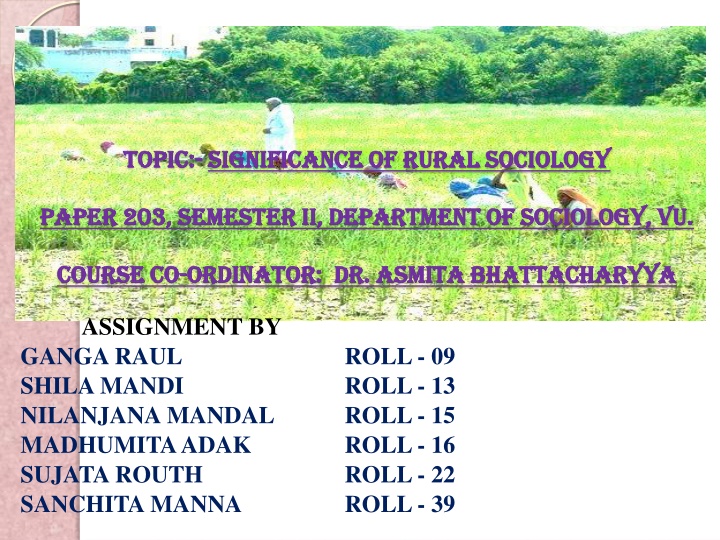
Significance of Rural Sociology in Today's Changing World
Rural sociology plays a crucial role in studying and understanding the complexities of rural life, exploring its problems, culture, and economic aspects. The discipline aims to empower rural communities and connect them to broader society, making it essential in today's evolving landscape.
Download Presentation

Please find below an Image/Link to download the presentation.
The content on the website is provided AS IS for your information and personal use only. It may not be sold, licensed, or shared on other websites without obtaining consent from the author. If you encounter any issues during the download, it is possible that the publisher has removed the file from their server.
You are allowed to download the files provided on this website for personal or commercial use, subject to the condition that they are used lawfully. All files are the property of their respective owners.
The content on the website is provided AS IS for your information and personal use only. It may not be sold, licensed, or shared on other websites without obtaining consent from the author.
E N D
Presentation Transcript
Topic: Topic:- - Significance of Rural Sociology Significance of Rural Sociology Paper 203, Semester II, Department of Sociology, VU. Paper 203, Semester II, Department of Sociology, VU. Course Co Course Co- -Ordinator Ordinator: Dr. ASMITA Bhattacharyya : Dr. ASMITA Bhattacharyya ASSIGNMENT BY GANGARAUL SHILAMANDI NILANJANA MANDAL MADHUMITAADAK SUJATA ROUTH SANCHITA MANNA ROLL- 09 ROLL- 13 ROLL- 15 ROLL- 16 ROLL- 22 ROLL- 39
Meaning of Rural Sociology: Rural sociology is the sociology of the village or village society. Rural sociology mirrors rural social life. This study detailed knowledge about different aspects of rural life, its problems, its culture, its religion, its economic and political life. The basic aim of rural sociology is to make the village people self sufficient & link them to the wider society at regional & national levels. Indian rural sociology or the science of the laws governing the specific Indian rural and social organization has still to be created. Such a science is, however, the basic premise for the renovation of the Indian rural society, so indispensable for the renovation of the Indian society as a whole. A.R.Desai
Definitions of Rural Sociology: The prime objective of rural sociology should be to make a scientific, systematic and comprehensive study of the rural social organization of its structure, functions and objective tendencies of development and on the basis of such study, to discover the laws of its development. A.R. Desai Rural sociology is the sociology of life in the rural environment. Sanderson The sociology of rural life is a study of rural population, rural social organization and the rural social processes operative in rural society. F. S. Chapin Such sociological facts and principles as are derived from the study of rural social relationships may be referred to as rural sociology. T. L. Smith
Characteristics of Rural Societies: Connected to Nature Occupations: Agriculture is the main one followed by animal husbandry & allied activities. Size of community is small. Agricultural occupation demands a higher land-man ratio than industrial one. Social Mobility is low Standard of living is low.
Significance of Rural Sociology Previously, Village society is characterised as highly static society. David Pocock & Louis Dumont asserted both rural and urban communities were a part of the larger civilisation of the subcontinent and two were two sides of same coin. During the last five decades rural people have witnessed massive changes calls for evaluating significance of rural sociology.
Massive Changes in rural areas a) Class Formation and Political transformation:- Implementing five-year plans & start of green revolution in 1960s & 1970s had created new classes. The new emerging agricultural bourgeoisie/capitalist farmers (comprising of newly rising rich kulak peasants & middle class peasants) showed interest in acquiring political power. However, the class formation and class differentiation in rural India is uneven process. This potholed agrarian development has caused conflict & contradiction at the village level. Resulted in rise in communalism and non secular power structure.
b) Panchayat Raj and Its Impacts The new power regime also emerged with Panchayat Raj System having reservation policies for SCs/STs & women. The structure & functioning of Panchayat Raj & in-built contradictions between progressive castes & dalits have affected rural structure.
c. Multi-Ethnicities A single or cluster of Indian villages follow various ethnic dialect, fairs & festivals distinct from other villages. For example, single village in north-eastern region viz. Bodos & Nagas, have their own dialect, own autonomy & own ethnicity. Rural sociology is essential to understand the diversities and coexistence.
d. Role of Nongovernmental Organization: Decentralization of power allows NGOs having more better understanding of the village life to implement development plans. In comparison to government agencies, NGO have more success stories for awakening village people. NGOs have comprehensive knowledge of village life but don t have much professional knowledge.
e) Poverty Removal Programnes- Removal of poverty removal programme has taken a multiplicity of forms. The small & marginal farmers are against big or Kulak farmers. Rise in new peasant movements on over wage-land to the tillers, distribution of wasteland, agrarian relations in the context of commercial crops and class discrimination. Success of various poverty alleviation programmes to reach to the target population, one need to understand the rural social structure and the factors pervasive in the social life.
Alternative model of Rural development: Gandhian Approach Gandhian scheme of Rural Development: Gandhi developed the concept of gram swaraj , i. e. , village autonomy. His village autonomy was not segmentary. He calls for an organic autonomy, where an isolated village was a part of the organic whole, i.e. the wider community. Gramdan and Bhoodan villages to be put in to practice.
Widening Horizons of Rural sociology :- Five decades back, rural sociology studied rural life, its simple composition and its ordinary lives due to absence of transport and communication. The village life was conceived to be a place of romance and merry - making. Later, land reforms, new agrarian class agricultural labourers, wage reforms, stratification, environment, and peasant movements & struggles between upper and lower peasantry classes of village life.
ConclusionS ConclusionS: :- - Development programs require a long time commitment & significant resources. Development of societies is a long term, continuous process to bring lasting change within societies. Involvement of community/Societal people is very crucial in any development programs. Priotising the use of available resources developed by the predecessor and /or societal people need to be actualised first. Societies active group formation is an on-going process that requires professional approach from the initiators.
REFERENCES: REFERENCES:- - Desai A.R. (ed.) (1969) Rural Sociology in India, Popular Prakashan, Bombay. Doshi Sociology. Rawat Publications. S.L. and P.C. Jain, (2009) Rural



